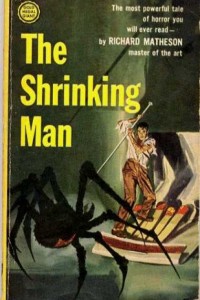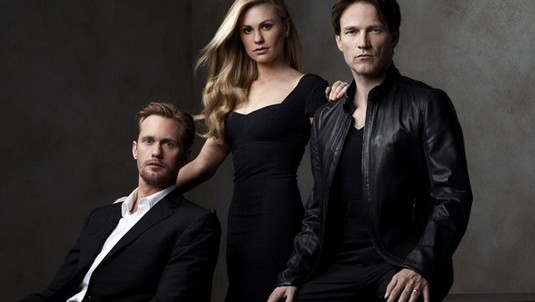Richard Matheson passed away on Sunday. By this time many have given their thoughts and feelings on Matheson’s body of work so I am inevitably going to re-hash what has been stated elsewhere by writers who are far more eloquent and learned than I am. I just wanted to jot down a few of my own, personal observations about Matheson’s writing because it has been so influential.
Also I’m going to drift away from talking about art, although I will touch on the subject by including some different covers for some of his most famous novels.
From as far back as I can remember I have loved fantasy, science fiction and horror. Some of my earliest exposure to the genre came from watching television as a kid and some of the movies and television shows that had a real impact on me came from the pen of Richard Matheson. I had no idea who he was at the time but looking back it is clear to me that his work had a lasting impression on my development.
 When I was a kid I loved horror movies and if one came on TV I was glued to it. Good bad or indifferent, it didn’t matter. I was right there. One of the earliest films I remember watching was The Incredible Shrinking Man. Originally made in 1957, it was based on Matheson’s novel Shrinking Man from 1956. Matheson adapted his own novel for the screenplay which was the recipient of a Hugo award. The film has since gone on to be selected fro the National Registry by the Library of Congress for being culturally, historically or aesthetically significant.
When I was a kid I loved horror movies and if one came on TV I was glued to it. Good bad or indifferent, it didn’t matter. I was right there. One of the earliest films I remember watching was The Incredible Shrinking Man. Originally made in 1957, it was based on Matheson’s novel Shrinking Man from 1956. Matheson adapted his own novel for the screenplay which was the recipient of a Hugo award. The film has since gone on to be selected fro the National Registry by the Library of Congress for being culturally, historically or aesthetically significant.
As a young kid in the 1970’s who loved scary movies, I didn’t care about that. I was completely engrossed in the creeping horror that the main character was facing as he discovered that he was slowly shrinking and that there was nothing that anyone could do about it. It struck a cord with me as a kid because I was the opposite. I grew slightly faster than my peers. I was a big kid for a long time and I remember wishing I could just stop and have everyone else catch up. I also remember desperately wanting to be a kid forever. I didn’t want to grow up.
Robert Carey’s dilemma, though opposite, had me watching in growing horror as he was slowly transforming… shrinking… away from everybody else. No one could possibly understand his torment (except the kid who was taller than everyone else). Inevitably his shrinking brings him down to a size where household pets are lethal. The scene where he is battling the house cat was terrifying. (Although looking back on it I wonder why his wife kept the cat given her husband’s diminutive size, you know?). And, of course, the final battle with a common house spider turns into an epic struggle for survival.
What really scared me as a kid was the ending. There is no happy ending. There is no cure for the shrinking man. He escapes the basement and looks up at the stars and realizes that although he will shrink down to atomic size he will still matter because, to God there is no zero. He takes comfort in that.
And there is the human condition. We cannot stop growing older. We cannot stave off death. We will eventually join with the dust and can only take solace in religion. That ending effected me in a very profound way.
Book editions of The Shrinking Man have usually chosen the battle with the spider as the cover image. It is the most memorable part of both the movie and the novel, but the entire story is unsettling and brings forward all of our fears about mortality and how many of us feel that we don`t fit in to a world that was not made for us.
 Another film that had a great impact on me was The Last Man of Earth based on his novel I Am Legend. It was a low-budget Italian picture made in 1954 and starring Vincent Price. Matheson wrote part of the screenplay but was dissatisfied with the result and took his name off. Still there was enough of the book in that movie to really creep me out as a kid watching it on TV. It`s concept of the last human being surrounded by vampires is terrifying and the scenes of Price dumping bodies into a burning pit gave me nightmares.
Another film that had a great impact on me was The Last Man of Earth based on his novel I Am Legend. It was a low-budget Italian picture made in 1954 and starring Vincent Price. Matheson wrote part of the screenplay but was dissatisfied with the result and took his name off. Still there was enough of the book in that movie to really creep me out as a kid watching it on TV. It`s concept of the last human being surrounded by vampires is terrifying and the scenes of Price dumping bodies into a burning pit gave me nightmares.
Two other adaptations of I Am Legend would follow, including the CGI laden Will Smith version that, although it retains the title, diverges most egregiously from the Matheson novel. No film adaptation has, I think, captured the point of the novel, which was the mind tripping realization that the hero, the last example of a “true” human being, is now, in fact, the pariah. When all of society becomes vampires, those that aren’t become monsters, hunting and killing innocent beings whose only crime is being a vampire.
I Am Legend, with its vampires created as the result of a world-wide plague, has been cited as the seminal influence on the genre of the zombie films. The concept of the zombie apocalypse that is so prevalent in movies today, comes from Richard Matheson. In an indirect way, Matheson can be said to be responsible for World War Z (but let’s not hold it against him).
I’m running out of space and time here, but here are just a few more influences on my childhood self. Duel was a 1971 TV movie starring Dennis Weaver as a salesman engaged in a battle of nerves with a faceless truck driver on a lonesome stretch of highway. The movie was directed by a then novice filmmaker Stephen Spielberg and it can be argued that the impact of Duel launched his subsequent career. The movie is a tense, white knuckle thriller that had a profound effect on this impressionable viewer.
And, of course, there are his numerous contributions to the Twilight Zone, most notably Nightmare at 20,000 feet. Anytime you see someone look out an airplane window and say; “There’s a man on the wing!”, you can thank Richard Matheson for that. It is a bit of humor that has become almost a cultural touchstone. That is, in itself, a singular achievement.
And, of course, one of my favorite TV shows as a kid was The Night Stalker, the show that my parents would not let me stay up to watch for fear that I would have nightmares (I would, of course, but they would have been worth it). Investigative reporter Karl Kolchak, the newspaperman with a penchant for the supernatural, was a Richard Matheson creation.
I could go one. His influence on me and on many readers and watchers of horror and fantasy was profound and his influence has shaped the genre as it is today. He was a giant and he will be profoundly missed.
M. D. Jackson has been drawing since he could first hold a pencil. He has been writing for so long that he has, in fact, developed an alternate personality named Jack to handle the fiction.
His work has appeared in numerous magazines and on the front covers of many books as well as in the pages of Amazing Stories Magazine. You can also see a lot of it at his gallery.










I’ve seem them referred to as “Suburban Gothics”
Matheson was one of the last (Nolan and Johnson are still around) of that circle of great writers of the 1960s. I don’t know if anyone has ever given them a name, ala The Lovecraft Circle. There work begins with Theodore Sturgeon, then Ray Bradbury, but I think it was really Charles Beaumont who was the ring leader. (Fritz Leiber, Bob Bloch and Rod Serling were on the fringes too). The type of horror tale they wrote was as much about style as it was terror. Ray Russell published many of them in Playboy and was one of them. Richard Matheson’s I AM LEGEND (despite 3 bad films) is one of the greatest novels of the 20th Century. More insightful than any Hemingway, Fitzgerald, etc. about life in the modern world.